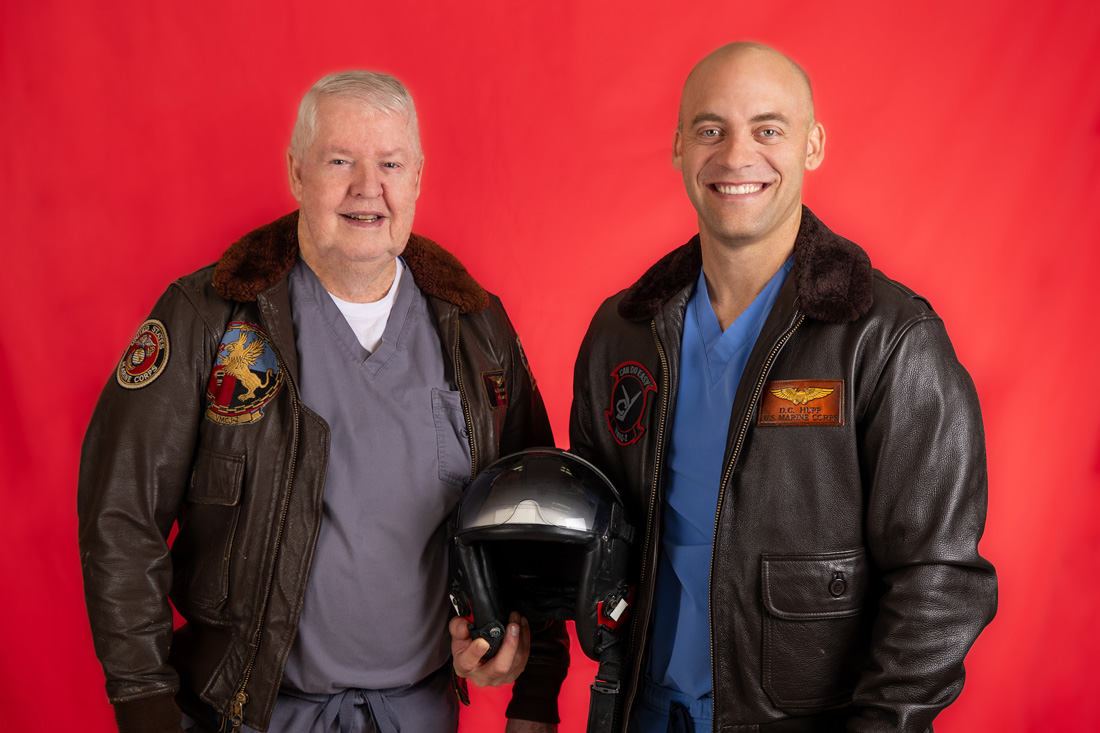A day in their scrubs: Daniel Hupp

Daniel Hupp is a third-year dental student at Texas A&M School of Dentistry. Before that, he was a Naval Flight Officer in the U.S. Marine Corps.
Where did you get your undergraduate degree? I went to the University of South Carolina in Columbia. I studied international business and finance. I have extended family in South Carolina, but I grew up just north of Fort Worth.
Why did you want to join the military? When I was growing up, I was always interested in serving in the military. My grandfather had been a pilot in the Air Force and the plane he was flying in the Vietnam conflict back in 1969 was shot down. It’s a long story, but they didn’t actually fully identify his remains until the ’90s. He was considered first a Prisoner of War then Missing In Action until then. I was 8 years old when they buried him in Arlington National Cemetery, and I was able to be there with my whole family and see his burial with full military honors. It left a really big impression on me. Then 9/11 happened, and that solidified my desire to serve.
How did you become a Marine aviator? I joined the Marine Corps after college through Officer Candidate School. It’s a 10-week commissioning program, followed by six months of training in infantry tactics. Then I got selected to fly, so I went down to Florida for flight school and spent almost two years in training before earning my wings.
What did you do in the Marines? I flew in a platform called the EA-6B Prowler. It’s a multi-crew electronic attack aircraft. It’s designed to deny, degrade or delay the enemy’s use of the electromagnetic spectrum … so radar and communications jamming was our main focus when we flew our combat missions.
The abbreviation for my squadron was VMAQ-2, Marine Tactical Electronic Warfare Squadron 2.* Back in Vietnam, it was called “VMCJ-2,” and when I came here to dental school, I learned that one of my professors flew in the same squadron as me years ago.
Tell us about the unexpected connection to the dental school. [Dr. George Cramer and I] were in the same squadron in the Marine Corps, almost 40 years removed. We initially bonded over our shared experiences as Marines and aviators. Then as we continued talking, we realized we were doing the same types of missions. He flew in Vietnam; I flew in Iraq and Syria. We finally pieced together that we flew in the same squadron despite the time difference. Dr. Cramer is an awesome clinician and a great mentor. He’s someone to look up to and is one of the school’s finest instructors.
When did you and Dr. Cramer realize you served in the same squadron? I think it was about halfway through my first year. He’s one of the pre-clinical instructors, definitely a class favorite. He’d always make a point to talk about his time in the Marines and we would talk about our shared connection there.
He brought some newspaper clippings and old memorabilia to show me, and I think it was one of those times we put it together. I brought him a patch from my squadron, and that was when we finally figured it out.
Why did you switch careers to dentistry? The Marine Corps decided to decommission our squadron and our aircraft, which had been in service since the 1970s, so we all knew we had to figure out our next steps. I loved the Marine Corps but knew it was time to do something different since I had been deployed so much as my wife and I were starting to grow our family. I had several mentors, and even our flight surgeon, suggest I look at health care as a bridge career. Dentistry seemed like a good fit between working with my hands, having a work-life balance and getting to help people directly.
Why did you join Texas A&M School of Dentistry? I had heard great things about the school, but honestly, my main objective was just “get into dental school.” After that, my priorities were to get into a Texas dental school, and then to get into Texas A&M because it’s the closest to my family. Since I’ve been married and had kids, we’ve been in the military and far from home, so this was the first chance to get back closer to the grandparents.
The instructors here are amazing. I’m thankful for my classmates, and especially my family. I wouldn’t be here without them. We tend to make dental school all about our own personal journey, but there are so many people who are part of getting you into and through dental school.
What are your future plans? I resigned from the Marine Corps, and then the next day I signed up with the Navy. I’ll be a Navy dentist when I graduate.
What advice do you have for nontraditional students? As a nontraditional student, I wondered how I would find my place in dental school. My previous experience has helped me view the challenges of dental school with a different lens, and I’ve been amazed by all the talented people I’m surrounded by here. Everyone brings value to the school, traditional background and non-traditional. Don’t ever think it’s too late to apply or find different opportunities to get where you want to go.
*Author’s note: This squadron was the last in the Marine Corps to use the Prowlers. The planes had been in use since the Vietnam War and were decommissioned in 2019. Marine Corps’ Last Prowler Aircraft Return from Final Combat Deployment | Military.com